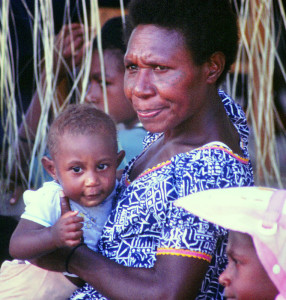 Authors love to hear from readers. As well as social media comments, I receive regular emails from people who have read Inside the Crocodile.
Authors love to hear from readers. As well as social media comments, I receive regular emails from people who have read Inside the Crocodile.
Sometimes they write because they had known nothing about Papua New Guinea and enjoyed the sense of discovery in reading the book; others contact me to say it brought back happy memories of time they had spent in the country.
But last week I received an email that was especially important to me. The correspondent was Rashmii Bell, in Papua New Guinea, and before I explain why her message touched me so much, let me tell you what little I know about her.
I have not met Rashmii, but she is on Twitter (@amoahfive_oh), so we sometimes exchange tweets, especially if I have enjoyed one of her opinion pieces because Rashmii is an emerging young writer who encourages other Papua New Guinean women to use their voices for a better life.
The reason Rashmii’s message was so important to me is that, for a writer on travel and culture, views from the people one is writing about offer the sternest, ultimate critique. Travel writers expose what they see of life in other cultures and we have a responsibility to be balanced in expressing truths as we find them. With Rashmii’s permission, I have pasted her email below:
Subject: A few comments about Inside The Crocodile
Message: Hello Trish:)
As you know I’ve just been reading ‘Inside the Crocodile’ and had a
wonderful time doing so! I haven’t read a piece of work about PNG so
engaging as your book.
Whilst it left me feeling sad when the book came to an end (you leaving Sandaun), I felt an overpowering sense of hope, faith – that women have and will continue to make an impact on the positive progress of PNG. There are so many instances in your accounts but by far the ‘bilased’ mothers protest sticks out in my mind!
These are the moments of history that more PNGns need to be made aware of to be inspired and know there is a way other than sitting in silence and feeling frustrated about important matters. There are far too many ‘Chrissie’s’, and rural mothers who walk for days to have their babies examined by nurses. Thank you for recording this in your book.
As a Papua New Guinean national, I learnt quite a bit from you about the places of my homeland, language and aspects of our culture. I think your perceptions about interactions (e.g., the expectations in accordance to cultural norms) with people are spot-on! I really
admire you for the way you handled your dealings with our PNG men,
particularly Mr. Kanawi and ‘Wilfred’ – I know far too many of the
latter and I can say I’ve probably been less tolerant, diplomatic than
what you strived to be.
I think how you handled that week in Waigani is Wonder Woman stuff – naturally, since you’d already trekked those days down to Lake Kopiago! Something I’ve never done (or any other trek for that matter).
I could write more to say thank you for a great read, but I’m planning to write a review of sorts – it’ll be my first so I’m quite nervous! Thank you, Trish. I continue to learn about writing from you. By the way, I think you’re incredibly funny. The opening lines of Chapter 16 had me in stitches :):):)
warmest regards,
Rashmii
There are few books about Papua New Guinea. Those that are available tend to be either academic analyses or adventure tales and in neither case do woman receive much, if any, attention, so I was delighted that my inclusion of PNG women’s lives and stories struck a chord with Rashmii.
You can find more details about Inside the Crocodile here, enjoy the brief video on my Home page here
And read Rashmii Bell’s latest opinion piece in which Virginia Woolf and Susan Sontag are recruited into Papua New Guinean womanhood here.
If you enjoyed this post, please share it with others.

This is wonderful. And yes – email from readers are special. For me, it’s those from local people who live in the country I’m writing about that mean most to me. It matters that I do justice to their country – and, as an ‘outsider’, it’s not always easy to know if you’ve done that.
A wonderful endorsement of your perception, observations and writing Trish. I can well imagine how touched you must have been. And yes, that responsibility is something we all need to be aware of, even people like me living in a European country. Never let it be said we all have the same culture here; we don’t. And I am very aware of how easy it is for misunderstandings to arise. Even here in Holland, I feel that responsibility.
Hello Jo, Val, good to see you. Yes, a responsibility we all share in an increasingly multi-cultural world. And another encouraging aspect is that as ‘Westerner’s’ travel accounts are distributed more widely, it can stimulate more local writers to write about their own country or region. Papua New Guinea has gifted writers, but the publishing industry there is not well developed. I hope you both read Rashmii’s interesting post on PNG women? 🙂